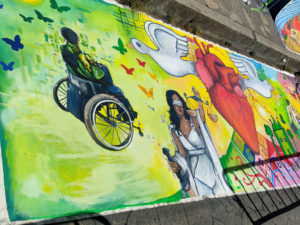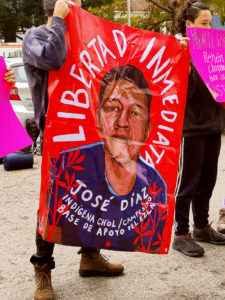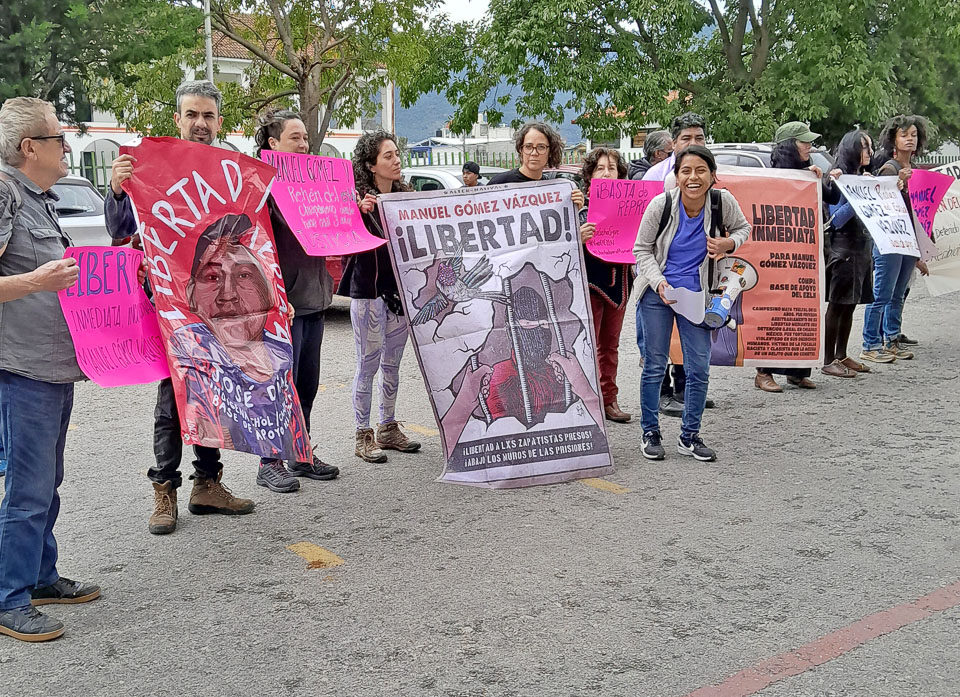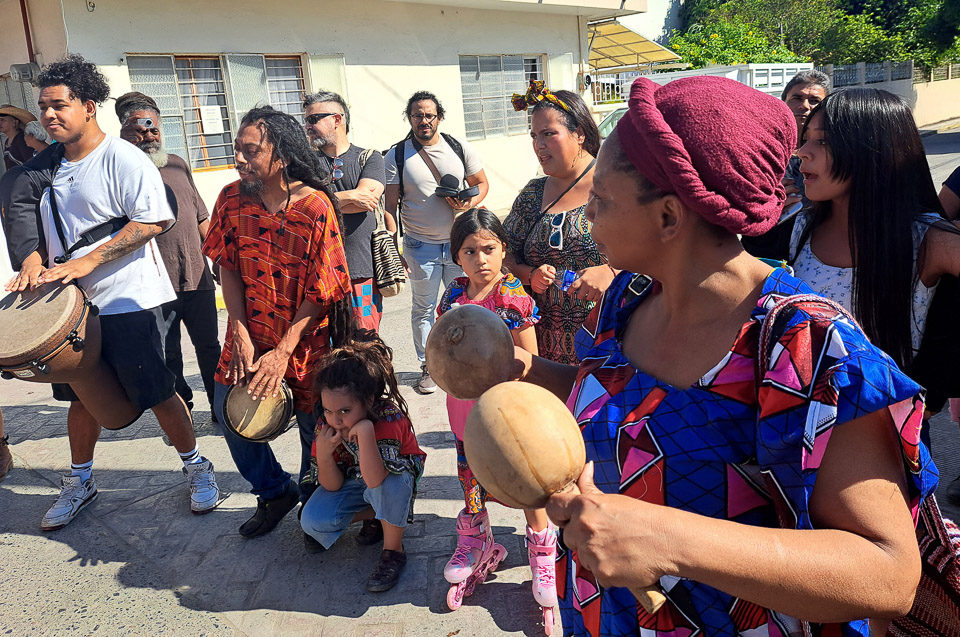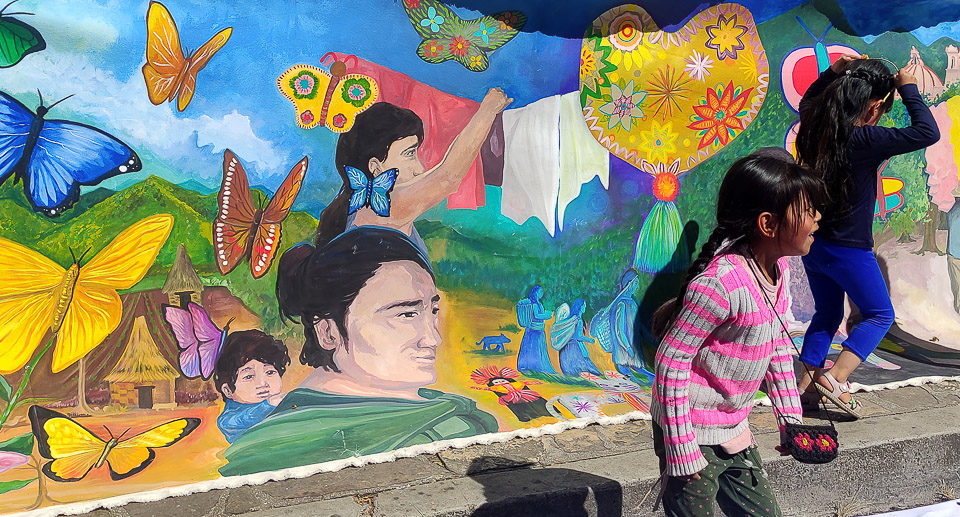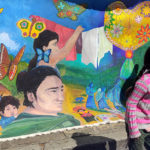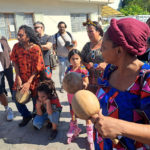Arbitrary detention remains a widespread practice in Mexico and is too often the catalyst for mistreatment, torture, forced disappearances and arbitrary executions, to obtain confessions and incriminating statements
A ccording to various reports from Mexican and international human rights organizations, arbitrary detentions are a recurring practice in Mexico.
This phenomenon involves the arrest of individuals without valid justification or illegally, violating the principles of due process. This conduct is a cause for great concern, since, in addition to violating fundamental rights such as freedom and the right to an adequate legal process, it facilitates the perpetration of other violations, such as extortion, threats, torture, forced disappearance or extrajudicial executions. It is crucial to emphasize that this practice predominantly affects people in situations of extreme poverty, belonging to indigenous peoples or people on the move.
According to the National Observatory on Arbitrary Detentions, between May 2018 and June 2020, 1,359 arbitrary detentions were recorded nationwide, with the most affected states being Chiapas, Veracruz, Baja California and Chihuahua.
Currently, Mexico is part of numerous instruments for the protection of regional and international human rights, such as the International Covenant on Civil and Political Rights, the American Convention on Human Rights, and the Political Constitution of the United Mexican States enshrines fundamental rights and universally recognized freedoms. Despite the legal protection that exists and some actions implemented by the Mexican government to comply with these legal requirements, arbitrary detention continues to be a current practice in the country, human rights organizations report.
For its part, the National Human Rights Commission (CNDH) states that “complaints (which before the CNDH are called “complaints”) begin a decline that has reached its lowest point in 2022. If organized by six-year terms, Felipe Calderon’s case accumulated 5,880 files of arbitrary detentions, Enrique Peña Nieto’s case 1,0217, and so far this year, with Andres Manuel Lopez Obrador, there are 385 files accumulated, a reduction of 93.45% of files on arbitrary detention. And the same with respect to other human rights violations.”
Fabrication of culprits: the case of Chiapas
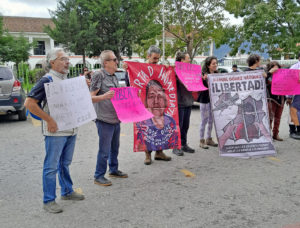
Mobilizations in favor of the release of political or unduly imprisoned prisoners, San Cristóbal de Las Casas, November 2023 © SIPAZ
The Fray Bartolome de Las Casas Center for Human Rights (Frayba) has coined the term “fabrication of culprits” to describe a practice that consists of a person being illegally detained, the prosecutors anticipate a version of events and those responsible, to then construct—even by illicit means such as torture—evidence that adapts to this version of events. This is not a new practice in Mexico, since it has been carried over from the previous penal system, he states. “Among the structural causes of this pattern is a demagogic punitive policy promoted by the State, that is, a political discourse that legitimizes the excessive use of the penal system and its bad practices, for which it is necessary to feed the numbers of detained and criminally prosecuted people. As a second factor, the lack of scientific capabilities is observed, which leads to the replacement of research with this simulation practice. Thirdly, it is identified that arbitrary detentions, fabrication of culprits, and torture are institutionalized practices by operators of the investigation system who transitioned from the previous to the current penal system, leading to the transmission of a culture and practices that legitimize this practice,” says Frayba.
In the practice of fabricating culprits, people are detained in illegal searches or on public roads, accused of a crime in flagrante delicto (to date, the most common is drug possession). While under ministerial detention, they suffer torture, are held incommunicado, and, in some instances, are victims of forced disappearances. During this period, evidence is fabricated against them for a second crime. Subsequently, an arrest warrant is requested, and once obtained, the people are released only to be arrested again for the second crime and transferred to a detention center. Using this strategy seeks to nullify the defense capacity of the detained people. According to cases documented by Frayba, people “have commented that at that moment they were very confused and afraid, which prevented them from defending themselves, due to torture (which usually includes threats not to mention what happened in court), change in the crime for which the person is accused, as well as a pattern in which public defenders do not communicate with victims, or advise them to remain silent and not mention what happened.”
It is worth mentioning that, in 2008, Mexico began the transformation of its criminal justice system, which was implemented in 2016. The new system seeks to guarantee the rights of victims and defendants. According to figures from the National Institute of Statistics and Geography (INEGI) at the national level, by 2021, 53.7% of the heads of state prosecutors’ offices were men and 55% were women, and they had more than ten years in service, which means that more than half of Mexican prosecutors come from the previous penal system.
It is not surprising, therefore, that arbitrary detentions continue to the present. This systematized practice leaves three types of victims. Firstly, there are people subjected to arbitrary detention whose life plan is suspended, in addition to presenting obvious physical, psychological and economic impacts resulting from detention and torture. The second group is made up of their families, mainly women, whose family and personal project is equally altered. Thirdly, we identify that this practice attacks the victims of the crime for which a culprit was fabricated, since they are denied the truth.
Discrimination, trace of pain and impunity
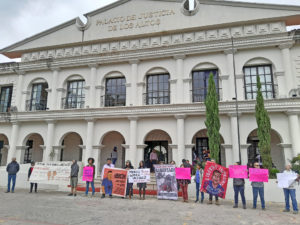
Mobilizations in favor of the release of political or unduly imprisoned prisoners, San Cristóbal de Las Casas, November 2023 © SIPAZ
The “fabrication of culprits” is indicated as a State policy that mainly affects population sectors that, due to their socioeconomic condition, have fewer legal and political defense capacities. In Chiapas and other states in southern Mexico, such as Oaxaca and Guerrero, it is predictable that this will especially affect the indigenous population, subject to structural discrimination. According to official data, Chiapas and Oaxaca contain 45% of the total indigenous population of the country.
In a report presented by several organizations from Chiapas to the United Nations (UN) Working Group on Arbitrary Detention, during its recent visit to Mexico, they stated that the indigenous population in Chiapas and Mexico is subject to a series of obstacles and differentiated effects that aggravate the condition of risk to arbitrary detention, torture or irregularities in the judicial process, including constant discriminatory treatment by the operators of the system. Some examples are the lack of language and cultural adaptation of detention processes and centers; greater difficulties for family members to make visits due to the distance from their communities or challenges faced, especially by indigenous women, in traveling; faults or deficiencies in the interpretation work during the trial; the stigmatization within their communities due to the fabrication of crimes against them, which in many cases even leads to the forced displacement of the family; the loss of agricultural lands that form a core of their identity; the impossibility of returning to their communities once they regain their freedom due to stigma or the loss of their land, as well as the need to become migrant workers; the lack of defense lawyers who speak their language. In the latter case, official data reported that in 2021, 85.2% of imprisoned indigenous people (almost 6,000 people) did not have access to an interpreter. The same year there were only 662 certified indigenous language interpreters: one for every ten inmates. On the other hand, the interpreters themselves suffer frequent episodes of discrimination, such as lack of respect or discrediting of their translations by judges.
Defending human rights has become a motive for arrest
The organization for freedom of expression Article 19 affirms that “the repressive purpose of unsubstantiated arrests to silence voices of dissent and nullify the work of defending human rights is evident.”
The criminalization of human rights defenders has the firm intention of reducing, limiting or eliminating their field of action, mainly when their defense is in favor of land and territory, say several human rights organizations. According to the organization Global Witness, which on September 12th, 2023 published its report “Always Standing Up: Land and Environmental Defenders at the Forefront of the Climate Crisis”, Mexico is the third most violent country for land defenders. and the environment, after Brazil and Colombia. In Mexico, 31 environmental defenders were murdered in 2022 (16 of them indigenous), making it the third most dangerous country to be a natural resources activist, only behind Colombia and Brazil where 60 and 34 activists were murdered, respectively. These three countries make up 70% of cases worldwide. Another element of concern in the case of Mexico is impunity: 90% of cases go unpunished. In addition, intimidation, threats, forced displacement, harassment and criminalization are other risk factors suffered by defenders.
In Oaxaca, the Assembly of the Peoples of the Isthmus in Defense of the Land and Territory (APIIDTT), a grassroots community organization made up of assemblies and authorities; indigenous, traditional and agrarian assemblies in civil resistance, collectives and cooperatives in Zapotec, Ikoot, Zoque and Mixe peoples, in the region of the Tehuantepec Isthmus, has repeatedly denounced the attacks against several of its members. Recently, they reported that there are 17 arrest warrants against their members. In 2023, David Hernandez, who has stood out for his leadership in opposition to the construction of an industrial park that will be part of the Interoceanic Corridor in Puente Madera, has received threats in addition to being arrested this year. “We take responsibility for the illegal detention of David Hernández Salazar, the climate of violence, violation of our rights and any measure of pressure, defamation, threat and aggression against our representatives of Puente Madera, the agencies and people of San Blas Atempa, and our regional organization APIIDT,” they stated. Currently, David is free while facing legal proceedings for a crime he did not commit.
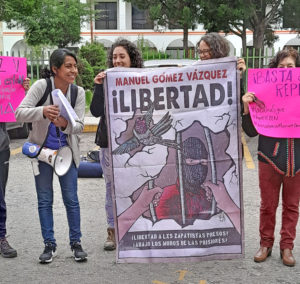
Mobilizations in favor of the release of political or unduly imprisoned prisoners, San Cristóbal de Las Casas, November 2023 © SIPAZ
In Chiapas, the Fray Bartolome de Las Casas Center for Human Rights has recently documented two cases where arbitrary detention has been used as a strategy to stop the actions of defenders of land and territory. The first case is that of Manuel Gomez Vazquez, a young Tseltal Mayan, member of the civilian bases of the Zapatista Army of National Liberation (EZLN). According to Frayba, Manuel Gomez was falsely accused of a crime he did not commit by community authorities, tortured by them and then criminally prosecuted by the Chiapas Indigenous Justice Prosecutor’s Office, who “participated in the prolongation of his detention, forced disappearance and fabrication of evidence against him”. On November 16th, Manuel Gomez, through an acquittal, was released as no responsibility for the commission of a crime was proven.
The second case is that of Manuel Santiz Cruz, Agustin Perez Dominguez, Juan Velasco Aguilar, Martin Perez Dominguez and Agustin Perez Velasco, Tseltal residents of the municipality of San Juan Cancuc, who through several organizations have resisted the militarization of their territory and the installation of megaprojects. Currently, they are detained and sentenced as a result of a crime fabricated by the Indigenous Justice Prosecutor’s Office.
International organizations such as Front Line Defenders and Indigenous Peoples Rights International (IPRI) have also observed this pattern; after a joint visit to the State of Chiapas in March 2023, they publicly stated the following: “We met with 30 defenders and indigenous authorities from 12 cases of defender[s] or community processes who face risks for their defense work (…) We identified a clear pattern of criminalization against indigenous defenders who defend environmental rights, territory, autonomy and self-determination their communities. This pattern is evident in the growing number of cases of fabrication of crimes and violations of due process, with a strong impact on community organization and the fight for collective rights. We observe this in cases such as that of Cristobal Santiz from Aldama and that of Father Marcelo Perez Perez from San Cristobal. We highlight that, in the current context of use of the criminal system against defenders and communities, there is a pattern of criminalization against those who have opposed the militarization of their communities and as part of their fight in defense of their rights. collectives.”
Arbitrary arrests in migrant journeys
Dr. Alethia Fernandez de la Reguera, researcher at the Legal Research Institute of the National Autonomous University of Mexico (UNAM), stated that Mexico is the Latin American country that has the largest and most strengthened immigration detention system in the region. “Compared to other Latin American countries, Mexico is the one with the most centers for deprivation of liberty for people on the move, with a total of 50, most of which began to be built between 2000 and 2010. And as for the detention of migrants, it noted that in 2021 the National Migration Institute detained 307,679 people, 80.7% from Central America, mainly from Honduras, Guatemala and El Salvador.”
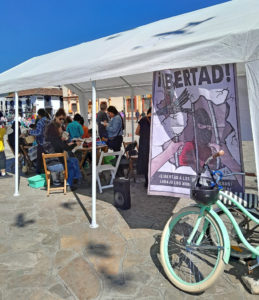
Mobilizations in favor of the release of political or unduly imprisoned prisoners, San Cristóbal de Las Casas, November 2023 © SIPAZ
Although migratory caravans to the United States have existed for many years, it was since 2018 that they became massive and public, which resulted in the government’s response with the creation of the National Guard and the militarization of the borders. Caravans allow migrants to travel in more protected ways, and they generally travel with people who cannot bear the costs of paying a smuggler. That is why the most vulnerable migrate in the caravans: women, women with their children, pregnant women, unaccompanied adolescents and the elderly. Those who make up the caravans leave their countries of origin not only because of poverty, but also because of criminal violence, state violence and even food insecurity.
The National Immigration Station Survey on Travel Conditions in Mexico 2021, carried out in August and September 2021 by the National Human Rights Commission (CNDH), shows that 37% of arrests occur on public transportation.
The Mexican State systematically detains and deports migrants and people in need of international protection. According to the Migration Policy, Registration and Identity of Persons Unit (UPMRIP), in 2021, the INM detained 309,692 people, and by 2022 the figure rose to 441,409. From January to July 2023, 317,334 arrest events have been recorded.
Immigration detention centers are managed by the National Migration Institute (INM). However, other security forces are present, such as the National Guard (GN), as well as private security companies, whose actions are not regulated by the Immigration Law. In these detention centers, euphemistically called Immigration Stations (EM) and Provisional Stays (EP), people are deprived of their liberty and are victims of cruel, inhuman and degrading treatment, several civil society organizations have documented.
The Driving Group Against Immigration Detention and Torture has described how the prison structure of these spaces of deprivation of liberty, added to the lack of communication with the outside world, and other actions to manipulate conditions aimed at exercising total control over the detained people, in which physical and psychological suffering, cruel, inhuman and degrading treatment, inflicted, causes a cumulative effect, constitute “torturing environments.”
Migrant childhood: detention in the middle of a painful journey
In 2020, the Migration and Refuge Law and the Law on the Rights of Children and Adolescents were harmonized; from that moment on, the migration detention of children and their families was prohibited and the higher interests of childhood were prioritized over the immigration administrative procedure.
The Southern Border Collective has documented how the Protection System shelters have become new immigration detention centers, in which even adults, mainly women, are deprived of their freedom, since families are frequently separated and men are sent to the immigration stations, this despite the fact that the Supreme Court of Justice of the Nation (SCJN) determined that immigration control at points other than those of formal entry constitutes an arbitrary and discriminatory act, and disproportionately affects racialized people.
UN Working Group on Arbitrary Detention voices its concerns
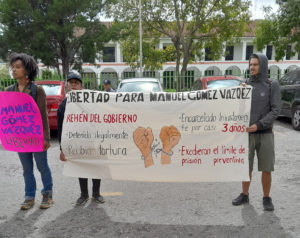
Mobilizations in favor of the release of political or unduly imprisoned prisoners, San Cristóbal de Las Casas, November 2023 © SIPAZ
The UN Working Group on Arbitrary Detention visited Mexico from September 18th to 29th, 2023 to speak with authorities and civil society organizations. “Of the approximately 90 thousand people in preventive detention (referred to as “in process”) in 2022, around 50 percent are subject to informal preventive detention, many of them had been subjected to prolonged informal preventive detention, some even remained for more than five years since their arrest,” said Ecuadorian expert Miriam Estrada-Castillo.
Matthew Gillett, Ganna Yudkivska and Miriam Estrada-Castillo also expressed that during these two weeks they observed weaknesses, “including the arrest registration systems; overly broad interpretations of flagrante delicto; insufficient access to effective legal assistance; excessively long periods of preventive detention; attacks on judicial independence and due process; an overly punitive approach to drug policy; and deficiencies in detention conditions.”
They stated that “a large number of migrants and asylum seekers are detained in Mexico, which amounted to more than 240 thousand in the first half of 2023.” They also highlighted the excessive use of force during the arrests by the Mexican military forces.
Furthermore, “a large number of girls and boys are detained in the context of migration. In 2022 alone, more than 126 thousand minors were channeled to centers managed by the National System for the Comprehensive Development of the Family (DIF). Although according to Article 99 of the Migration Law, minors are not allowed to remain in immigration detention, in practice, migrant girls and boys are often deprived of their liberty, either in shelters exclusively for unaccompanied minors, managed by the DIF or in facilities shared with immigration stations, under the authority of the National Migration Institute.
Finally, the experts reported that they will present their report on the visit to Mexico to the Human Rights Council in September 2024.
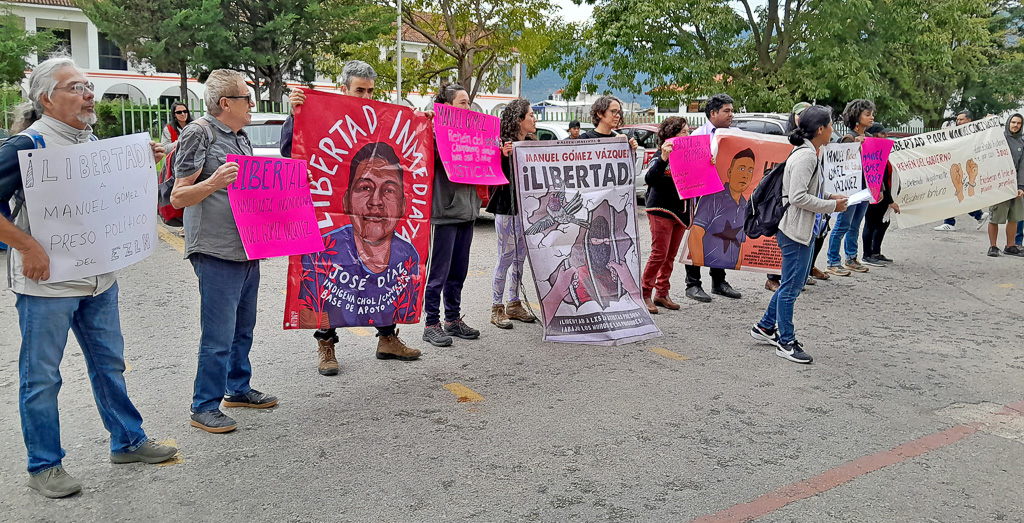
Mobilizations in favor of the release of political or unduly imprisoned prisoners, San Cristóbal de Las Casas, November 2023 © SIPAZ

